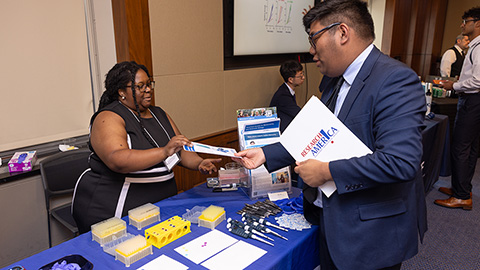ASBMB weighs in on changes to NIH fellowship review
The American Society for Biochemistry and Molecular Biology sent feedback in June to the National Institutes of Health about its proposed changes to the Ruth L. Kirschstein National Research Service Award fellowship application and review process.
The proposed changes indicate that the NIH adopted nearly all of the ASBMB’s earlier recommendations (here and here) to reduce institutional and investigator bias and refocus the evaluation on an applicant’s potential and the impact of the proposed training.
“We are thrilled with the proposed changes to the NRSA application materials and review guidelines,” said Sarina Neote, ASBMB’s public affairs director. “The NIH and working group have done an excellent job at making this grant review process more equitable for all participants and applicants. We are confident that these changes will propel the scientific enterprise forward by investing in the next generation of scientists from diverse backgrounds and experiences.”
The NRSA fellowship is a multiyear grant designed to support doctoral or dual-doctoral degree candidates. According to the NIH, the award allows trainees “to obtain individualized, mentored research training from outstanding faculty sponsors while conducting dissertation research.” One important goal of this program is to enhance the diversity of scientists entering the biomedical, behavioral and clinical sciences, and the NIH encourages applications from scientists from underrepresented backgrounds, racial and ethnic groups as well as persons with disabilities.
Reducing bias
The NIH proposes restructuring the scoring guidelines to reduce emphasis on institution and sponsor. To achieve this, it would eliminate the “Institutional Environment and Commitment to Training” and “Sponsors, Collaborators, and Consultants” scoring sections. Reviewers would instead evaluate the “Science and Scientific Resources” and “Training Plan and Training Resources” categories.
The ASBMB said that change should help reviewers identify the most promising applicants while combatting biases favoring senior investigators at well-resourced institutions.
The NIH also proposes implementing implicit bias training for NRSA reviewers. The ASBMB supports this move, as it is consistent with the society’s previous recommendations.
Special circumstances
Another matter that the society’s previous recommendations to NIH raised was that of education and employment gaps. The ASBMB previously suggested that NRSA applications include an “Optional Statement of Special Circumstance” so that individuals could explain gaps in employment or education. The NIH adopted the ASBMB’s suggestion.
In its June feedback, the ASBMB encouraged NIH to also include a list of possible reasons to submit an “Optional Statement of Special Circumstance,” such as a leave of absence due to caregiving or sexual harassment. The ASBMB said providing examples might “empower” applicants to share their circumstances and give them the “full opportunity to shine in their application without risking negative assumptions or bias.”
Better measures
NIH proposes removing grades from the NRSA application materials and adding a section in which applicants can describe leadership and volunteer experiences, both changes in line with the society’s earlier recommendations.
In its June feedback, the ASBMB said this will allow reviewers to get a better, holistic impression of applicants and encourage trainees to “develop important soft skills that are critical for successful research careers.”
One sticking point
Finally, the ASBMB raised concerns about the applicant self-assessment and sponsor reflection, both of which are designed to highlight areas in which the trainee can improve and/or acquire skills that will propel their future scientific career.
The ASBMB pointed out that the Federation of American Societies for Experimental Biology already has noted that the instructions for statements are unclear and present a potential opportunity for gamification and requested clarification.
Enjoy reading ASBMB Today?
Become a member to receive the print edition four times a year and the digital edition monthly.
Learn moreGet the latest from ASBMB Today
Enter your email address, and we’ll send you a weekly email with recent articles, interviews and more.
Latest in Policy
Policy highlights or most popular articles

Embrace your neurodivergence and flourish in college
This guide offers practical advice on setting yourself up for success — learn how to leverage campus resources, work with professors and embrace your strengths.

ASBMB honors Lawrence Tabak with public service award
He will deliver prerecorded remarks at the 2025 ASBMB Annual Meeting in Chicago.

Summer internships in an unpredictable funding environment
With the National Institutes of Health and other institutions canceling summer programs, many students are left scrambling for alternatives. If your program has been canceled or delayed, consider applying for other opportunities or taking a course.

Black excellence in biotech: Shaping the future of an industry
This Black History Month, we highlight the impact of DEI initiatives, trailblazing scientists and industry leaders working to create a more inclusive and scientific community. Discover how you can be part of the movement.

ASBMB releases statement on sustaining U.S. scientific leadership
The society encourages the executive and legislative branches of the U.S. government to continue their support of the nation’s leadership in science.

ASBMB and advocacy: What we accomplished in 2024
PAAC members met with policymakers to advocate for basic scientific research, connected some fellow members with funding opportunities and trained others to advocate for science.

